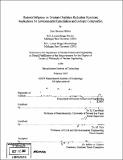Bacterial influence on uranium oxidation reduction reactions : implications for environmental remediation and isotopic composition
Author(s)
Mullen, Lisa Maureen
DownloadFull printable version (34.77Mb)
Other Contributors
Massachusetts Institute of Technology. Dept. of Nuclear Science and Engineering.
Advisor
K. Czerwinski.
Terms of use
Metadata
Show full item recordAbstract
The bacterial influence on the chemistry and speciation of uranium has some important impacts on the environment, and can be exploited usefully for the purposes of environmental remediation of uranium waste contamination. It is important to understand both from a scientific and environmental perspective how different types of bacteria can affect the chemistry and speciation of uranium. Analysis of the kinetics of uranium reduction, to determine the influence of external governing factors, can help us to understand the mechanisms of uranium reduction in vitro and aid in the design of more effective uranium remediation schemes in the environment. Bacterial reduction kinetics are found to fit well to a first order exponential decay model. Using this model we have determined the dependence of the rate of bacterial uranium reduction on several parameters, including bacterial density and pH. Understanding the reduction kinetics is also an important step in the determination of the extent of isotopic separation that occurs as a result of the bacterial reduction process. Here, we demonstrate that isotopes of uranium, the heaviest naturally occurring element, are subject to fractionation when uranium serves as a terminal electron acceptor during anaerobic bacterial respiration, resulting in an enrichment of 235U in the reaction product, UO2. The manganese oxidizing bacterium Leptothrix discophora produces manganese oxides with can both adsorb uranyl and partially oxidize UO2. Determination of if and how bacteria can influence the oxidation of uranium is important because oxidation will increase the solubility and mobility of uranium in the environment. (cont.) Although oxidation of UO2 by biologically precipitated manganese oxides occurs to some degree, reduced uranium remains associated with the manganese oxides in a surface complex and is not significantly mobilized. Taken together, a more complete knowledge of how bacteria can influence the speciation of uranium in the environment will improve not only our fundamental understanding of bacterial interactions with uranium, but also how we can effectively model uranium transport in the environment and our abilities to clean-up uranium contaminated soils and groundwater both cheaply and safely.
Description
Thesis (Ph. D.)--Massachusetts Institute of Technology, Dept. of Nuclear Science and Engineering, 2007. Includes bibliographical references (p. 239-247).
Date issued
2007Department
Massachusetts Institute of Technology. Department of Nuclear Science and EngineeringPublisher
Massachusetts Institute of Technology
Keywords
Nuclear Science and Engineering.